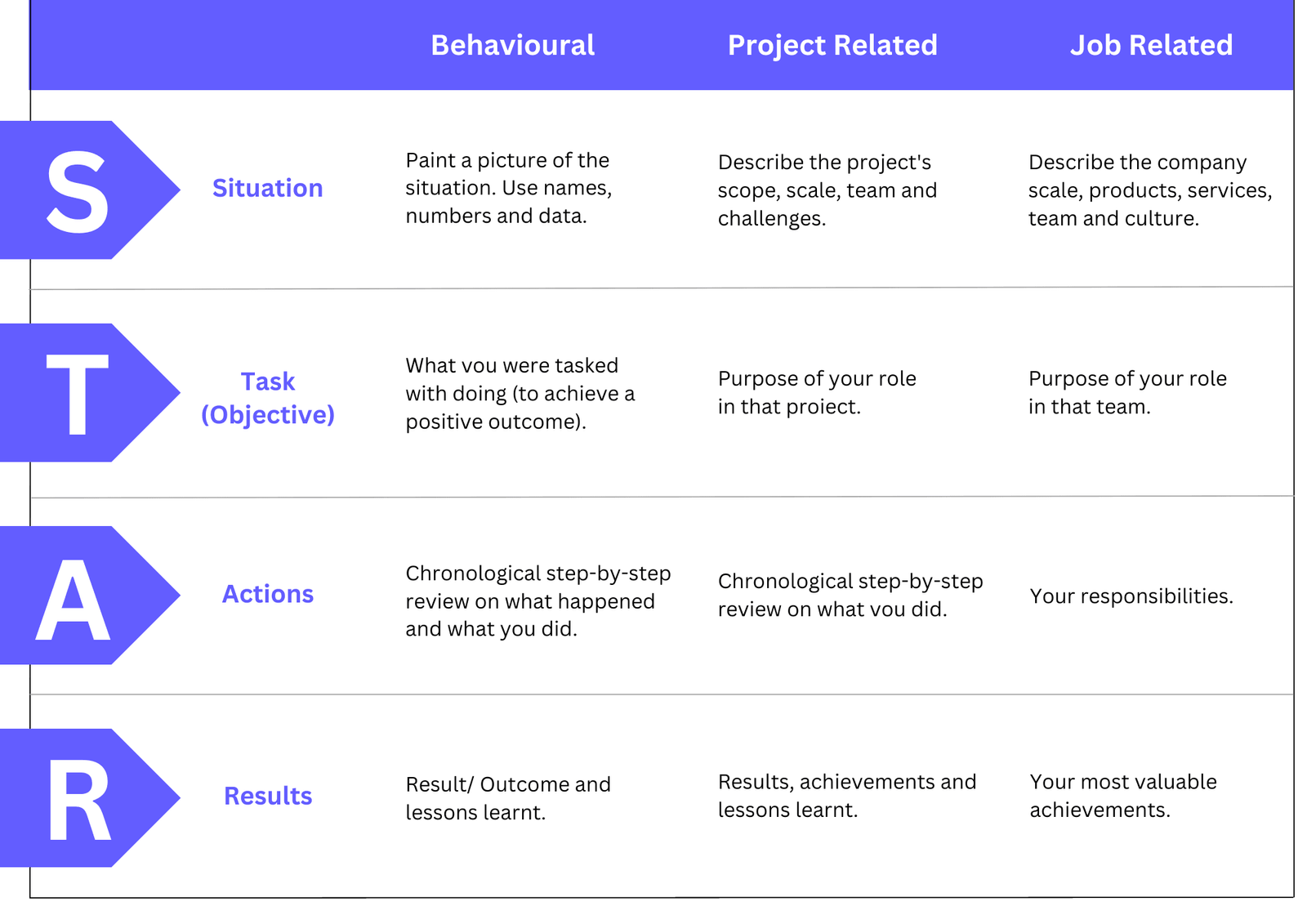How To Use The STAR Interview Method for Interview Success
What is the STAR Interview Framework?
Behavioural interviews are a type of job interview that focuses on assessing past behaviour to predict future performance. The STAR (Situation, Task, Action, Result) method for interview is an effective way to prepare for such interviews, allowing individuals to structure their responses and provide concrete examples. With the STAR framework, candidates can showcase their skills and achievements, increasing their chances of success in the interview process. Imagine entering an interview armed with a proven strategy that allows you to deliver concise, compelling responses while showcasing your skills and experiences in a clear and organised manner. That’s precisely what the STAR framework offers. Let’s break it down and understand how it can unlock your interview potential.
The Components of STAR: Situation, Task, Action, Result
Situation: Setting the Stage for Success
In any interview, it is crucial to provide context and background to the situation you are about to describe. By clearly defining the scenario, you enable the interviewer to understand the challenges you faced and the decisions you made.
Task: Defining Objectives and Overcoming Challenges
Now, let’s dive deeper into the specific task or objective that needed to be accomplished in that situation. Share the challenges you encountered and the goals you set for yourself. This step demonstrates your ability to analyse situations and define actionable targets.
Action: Stepping Up and Making an Impact
Here comes the exciting part—detailing the actions you took! Describe the steps you implemented to address the situation at hand. Emphasise the skills you applied, the decisions you made, and how you navigated any obstacles along the way. This showcases your problem-solving abilities and decision-making skills.
Result: Celebrating Achievements and Lessons Learned
Every journey has its destination, and your actions should have produced results. Share the outcomes of your efforts, quantifying achievements wherever possible. Highlight the positive impact you made, lessons learned from the experience, and any personal growth that occurred.

STAR Technique for Interviews: Examples
Role: Management
Interviewer: “Tell me about a time when you faced a challenging situation at work and how you handled it.”
Candidate:
Situation: “In my previous role as a project manager, we had a tight deadline to deliver a critical project for a client.”
Task: “My task was to coordinate the efforts of a cross-functional team, manage resources effectively, and ensure timely completion.”
Action: “To address the challenge, I immediately scheduled a team meeting to discuss the project requirements and break down the tasks. I assigned clear responsibilities, set realistic deadlines, and established regular progress check-ins.”
Result: “As a result of our collaborative efforts and effective project management, we successfully delivered the project ahead of schedule, exceeding the client’s expectations and receiving positive feedback. Our team’s coordination and proactive approach helped us overcome the challenges and achieve outstanding results.”
In this example, the candidate addresses the interview question by using the STAR method. They provide a specific situation, clearly define their task, explain the actions they took, and conclude with the positive results achieved. This structured response allows the interviewer to assess the candidate’s skills, problem-solving abilities, and their capacity to handle challenging situations effectively.
Role: IT
Interviewer: “Tell me about a time when you had to troubleshoot a complex technical issue and how you resolved it.”
Candidate:
Situation: “In my previous role as an IT support specialist, we encountered a critical system outage during a major software upgrade.”
Task: “My task was to identify the root cause of the issue, minimise downtime, and restore system functionality as quickly as possible.”
Action: “I immediately initiated a thorough analysis of the system logs, collaborated with the development team to understand the upgrade process, and conducted extensive testing to isolate the problem. After identifying a compatibility issue, I devised a workaround solution and implemented it promptly.”
Result: “As a result of my troubleshooting efforts and swift action, the system was successfully restored within two hours, minimising business disruption and ensuring smooth operations. Furthermore, I provided detailed documentation on the issue and the implemented solution, enabling the team to prevent similar issues in the future.”
In this example, the candidate effectively uses the STAR framework to outline the situation, task, action, and result of a complex technical issue they faced. This response allows the interviewer to assess the candidate’s technical problem-solving skills, ability to work under pressure, collaboration with teams, and dedication to minimising downtime.
Why Use the STAR Interview Technique?
The STAR interview questions allow you to captivate interviewers, showcase your abilities, and leave a lasting impression through structured storytelling.
Presenting Organised and Impactful Responses
Employing the STAR framework allows you to deliver answers in a structured and concise manner. By avoiding rambling and tangents, you ensure that your responses remain focused and coherent, captivating interviewers from beginning to end.
Showcasing Your Skills and Experiences
Behavioural interviews aim to assess your abilities in various situations. The STAR framework enables you to effectively demonstrate your problem-solving skills, decision-making prowess, and capacity to handle challenges professionally. It’s your chance to showcase your unique strengths and stand out from the competition.
Quantifying Achievements: Making a Lasting Impression
Numbers speak volumes. By providing measurable outcomes and tangible results of your actions, you enhance your credibility and make a lasting impression on interviewers. Quantifying your achievements adds a layer of authenticity and demonstrates your impact in a tangible way.
Mastering the STAR Interview Questions and Answers
To harness the full potential of the STAR framework, preparation and practice are paramount. Here’s how you can take your interview performance to new heights:
Craft Tailored Responses: Highlighting Relevance
Customise your STAR responses to align with the specific position you are interviewing for. Emphasise skills and experiences that directly correspond to the job requirements, showcasing your suitability and value as a candidate.
Be Specific and Concise: Balancing Depth and Brevity
Ensure your responses are specific and avoid vague statements. Share detailed examples and provide tangible evidence of your capabilities. Strike a balance between providing thoroughness and brevity to maintain engagement.
Emphasise Your Role: Stand Out from the Crowd
In your STAR responses, highlight your personal contributions and the unique value you brought to the situation. Showcase your leadership, teamwork, or problem-solving skills. Demonstrate your ability to take initiative, drive results, and leave a lasting impact.
Conclusion
The STAR method is a powerful tool for interview preparation and success. By organising your responses using the Situation, Task, Action, and Result structure, you can effectively highlight your skills and experiences. The STAR interview format allows you to provide specific examples, demonstrate your problem-solving abilities, and showcase your potential to prospective employers. So, whether you’re preparing for your next job interview or seeking to enhance your interviewing skills, incorporating the STAR framework can significantly improve your chances of making a lasting impression and securing that coveted job offer.
PSCareers Interview Mastery Course
The best government interview resource.
5+ Hours of Video and downloads from the most experienced PS experts.
Backed by a 7-day 100% Money Back Guarantee.



















You must be logged in to post a comment.